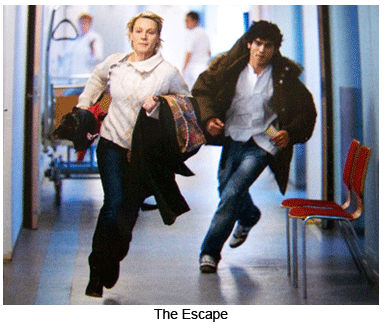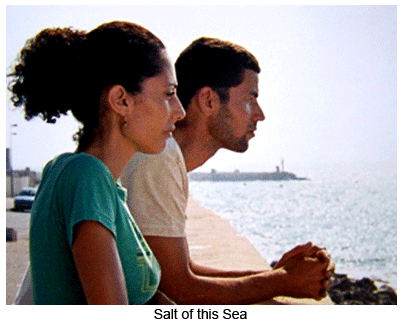- A fresh start
- Guest Editor’s Column
- Cast in Bronze
- The month that was
- Visual Diary
- Nomadic Detours
- Relation Next
- Lightness of being Anxious
- Necklace of Echoes
- The New Order Beauty
- Voyage
- Ribbed Routes
- Museum Talk
- Hard Talk
- Master Stroke
- Market Insight
- Artist Index and Statistics
- Auction Reports
- Creative Impulse
- Mid Century Modern : Retro Furniture
- 14th Kolkata Film Festival
- ABOHOMAN
- In the News
- Photo Feature
- Different hues of Aakriti
ART news & views
14th Kolkata Film Festival
Volume: 2 Issue No: 1 Month: 2 Year: 2010
It was the discovery of Korean Director Kim Ki Duk, Perfume; the story of a Murderer based on Patrick Suskind's best smelling novel, and Wajda's 'Katyn' that enthralled the audience in the 14th Kolkata Film Fest but the recent 15th Fest (November 10-17, 2009) will be remembered for a gamut of films that centers around the notion of displacement, migration and identity. The festival films were a moving act of emotional archaeology and memory, a record of an essentially irrevocable past, for instance Palestinian filmmaker and writer Annemarie Jacir's 'Salt of This Sea' is a story of displacement and exile, a narrative of departures, and a celebration of identity as something multiple and fluid.  Palestine is now Israel; Lebanon was transformed by twenty years of civil war, and colonial monarchial Egypt disappeared in 1952, the Iraq war, and the drone attacks in Afghanistan. In many films, protagonists who are Arab but Christian or Muslim but the holder of an US passport, overwhelmed by the sense of an outsider in a Jew presence, exacerbated by never knowing the proper accent. The experience of West Banks- a newly transformed landscape is today only a dissonant identity trying to voice through this range of films- a silenced muted voice and the experience of dispossession. Along with language, we tend to forget, that it is geography which is a mental construct, especially in the displaced forms of departures, arrivals, farewells, exile, nostalgia, homesickness, belonging, and travel itself- that is the core of memories of human existence. Any dislocation seems to embody a loss that subsumes all other losses.
Palestine is now Israel; Lebanon was transformed by twenty years of civil war, and colonial monarchial Egypt disappeared in 1952, the Iraq war, and the drone attacks in Afghanistan. In many films, protagonists who are Arab but Christian or Muslim but the holder of an US passport, overwhelmed by the sense of an outsider in a Jew presence, exacerbated by never knowing the proper accent. The experience of West Banks- a newly transformed landscape is today only a dissonant identity trying to voice through this range of films- a silenced muted voice and the experience of dispossession. Along with language, we tend to forget, that it is geography which is a mental construct, especially in the displaced forms of departures, arrivals, farewells, exile, nostalgia, homesickness, belonging, and travel itself- that is the core of memories of human existence. Any dislocation seems to embody a loss that subsumes all other losses.
Kathrine Windfeld 'The Escape' (Denmark) is about a Danish journalist Rikke Lyngvig taken hostage in Afghanistan. With the help of one of the terrorists, the young Nazir, she manages to escape. On her return to Copenhagen, she was in the spotlight. Meanwhile, Nazir manages to flee Afghanistan and lands up in Denmark.  When he finally meets Rikke, she is shocked and torn apart by the turn of events. She is unwilling to help her as that would jeopardize her career, the tumultuous encounter turns into an ill fated confrontation and a nation driven by avarice for sensation and political populism.
When he finally meets Rikke, she is shocked and torn apart by the turn of events. She is unwilling to help her as that would jeopardize her career, the tumultuous encounter turns into an ill fated confrontation and a nation driven by avarice for sensation and political populism.
The surprise this time was Marta Meszaros (born 1931) retrospective that includes Diary for My Children, Diary for My Loves, Diary for My Father and Mother and Little Vilma- The Last Diary; that broke new grounds in Hungarian cinema. The autobiographical trilogy made in the 80's along with Vilma was probably shown in India for the first time revolves around personal experiences spanning the World War II, the invasion of Russia in Hungary and the Fall of Stalin and after. A brilliant director respected internationally, her 'Diary' films are considered masterpieces of World cinema for sensitive rendering rebellion and exploration in the processes of historical and personal memory implicating the State in the politics of gender while she seamlessly gazes and examines a patriarchal society with her fluid style and film craft. The festival also showcased retrospectives of Yilmaz Guney, Fellini, Ousmane Sembane, Andrzej Wajda, Caroline Link and Nikos Panayotopolous.